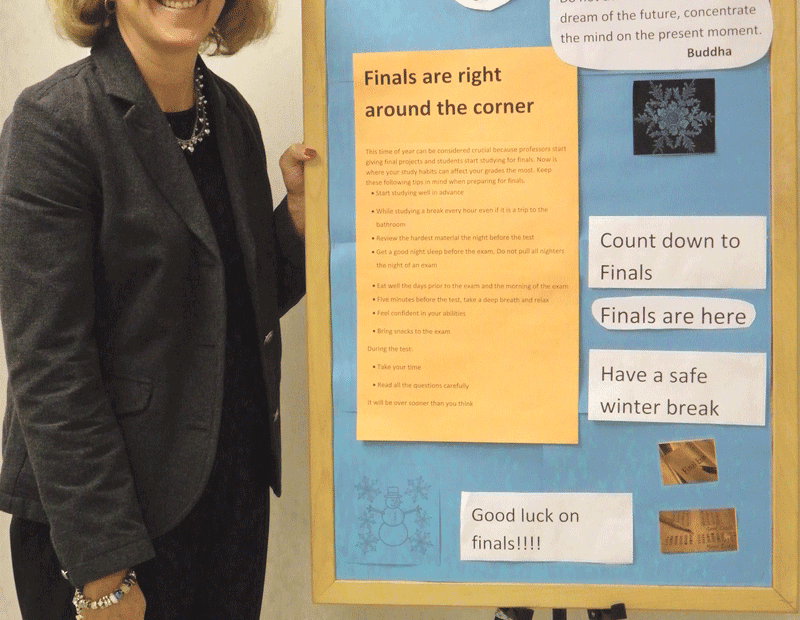Job Prospects Are Bright for the Class of 2012
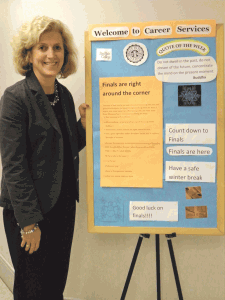
Sally Schirner-Smith says students network, do volunteer work, take internships, and use the Internet to make themselves marketable.
There are a number of indications that the employment outlook for college seniors is fairly bright — from the strong turnout of employers at recent job fairs to statistics showing an uptick in overall hiring. Recent and upcoming graduates have other things going for them as well, especially a proficiency with technology that gives them a decided edge over older individuals competing with them for job opportunities.
Nic Wegman calls it a “competitive edge.”
He was referring to technology, and, more specifically, the ability of recent and upcoming college graduates to understand it and take full advantage of it when it comes to both handling a job and applying for one.
“Their relationship with technology is seamless and almost intuitive,” said Wegman, executive director of the Career Center at the Isenberg School of Management at UMass Amherst, citing just one of their strengths.
His colleague, Jeff Silver, touched on another. “Our graduates have a real edge,” concurred the director of Career Services at UMass Amherst, adding that more than 60% of its undergraduates complete internships that allow them to show off their skills and network with professionals in their field.
And although local experts say it’s a little early to project how the class of 2012 will fare after graduation, indicators are bright. “Employers booked every space we have for a job fair in February; in the past, it was more challenging to get them to sign up,” said Silver, adding that an employer networking event in New York City this month reached maximum capacity in terms of employers, as did an engineering fair last fall.
“We had employers in the hallway,” he recalled. “It’s a positive sign because in the past we had to call companies and go through our database to find people who were hiring. But this year employers are running to us.”
Deborah Pace, director of employer relations at Western New England University, said a job fair held in November for the class of 2012 attracted 45 employers who “had openings and were willing to hire graduates.”
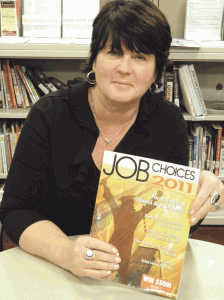
Barbara Kautz, director of the Career Center at Springfield College, says today’s college graduates offer advanced Internet skills and a tremendous amount of energy and enthusiasm.
In addition, employers who participated in the Job Outlook 2012 survey conducted by the National Assoc. of Colleges and Employers (NACE) said they plan to hire 9.5% more graduates in 2011-12 than they did in 2010-11. The majority of jobs are entry- level positions, but NACE reports the average salary offer for grads in the class of 2011 rose 6% over the previous year’s average, soaring from $48,288 to $51,171. However, career experts do say there is a wide variance in those numbers because students who major in accounting, engineering, or computer fields earn far more than those who study liberal arts.
For this issue, BusinessWest talked with career experts about the prospects for the class of 2012, as well as the forces that will shape their job-search fortunes.
Progress in Degrees
Wegman works with people who are pursuing degrees in management, marketing, finance, accounting, operations management, hospitality management, and sports management.
“They’re faring better in this economy than students from higher-education backgrounds in other fields,” he said. “Companies that are hiring are looking for the skill sets they have mastered.”
He added that the buzzword, or phrase, often used by corporate recruiters is ‘transferable skills.’ Today’s business graduates have them, and Wegman said they include “the ability to solve problems using data. Our graduates are able to model and use analytics that can lead to potential solutions.”
Nearly half (47%) of students in the graduating class of 2011 who responded to a UMass survey said they had accepted a job related to their field of study before graduation, and an additional 15% had jobs three months later. “We feel very confident that, if anything, these numbers are understated,” Wegman added.
The poll’s results showed that 70% of these jobs were in Massachusetts, 11% were in New England, and 7% were in New York or New Jersey. “So the outlook for business students with a four-year degree is better than the press is portraying; they seem to be disproportionally sought after by companies in this difficult market,” Wegman said, adding the average salary for entry-level jobs his students accepted ranged from the 30s to the high 50s.
Pace agrees that students with degrees in accounting, finance, or telecommunications are in demand, and said graduates in these fields almost always have a job offer before graduation.
Their sophisticated knowledge of technology gives them an edge over older workers, said those we spoke with.
“There is no doubt that there is a generational difference,” Wegman explained. “Students can use multiple devices at the same time and process and solve so much through the efficient use of technology that it is almost mindboggling.”
Barbara Kautz, director of the Career Center at Springfield College, is also impressed by students’ advanced technological abilities. “Their comfort, savvy, and expertise can be better and more refined than those who didn’t grow up with the Internet. They may not have much work experience, but their personal involvement with technology surpasses that of many other people looking for employment,” she said.
Recent graduates in any field of study are also willing and able to research a company’s history and apply for jobs quickly online. “It’s as simple for them as ‘click, click, click,’” Pace said. “And new college graduates are adept at using Microsoft Office products.”
Kautz said the students’ ability to present information about a company works to their advantage. “If a candidate fails to demonstrate knowledge about an organization, he or she is unlikely to be hired,” she told BusinessWest.
Meawhile, many businesses use the Internet to research a candidate by viewing their Facebook or LinkedIn profiles. “They are looking for a certain level of professionalism,” Kautz said, adding that, in some instances, job offers have been rescinded if inappropriate pictures or postings are discovered. “A candidate may be a finalist for a job, but the employer wants to check the way the person represents themselves,” she explained.
Students with degrees in health care, which include physical and occupational therapy, as well as accounting, marketing, and retail management, are also in high demand. “There is opportunity for growth in these fields, and these grads don’t have the dilemma of identifying jobs that students in other liberal-arts programs have,” Kautz said.
Smart Choices
Many students take advantage of internships, which gives them with a clear picture of what is expected in the workplace as well as an inside track with what is going on within the company.
“It provides them with an edge because most employers are looking for candidates who can help move their organization forward,” Kautz said. “And because graduates are at the beginning of their careers, they throw themselves into their work with eagerness. That’s not to say people in their 40s and 50s don’t have as much energy, but they may have some reservations or ambivalence if they’ve been laid off, which can result in a morale issue.”
Sally Schirner-Smith, director of Career Services at Bay Path College, said that school requires students to perform an internship or have experience in their field before graduation. “We have found it is very beneficial for leveraging employment. If an employer has trained a student or put them through an orientation and they are a good fit for the company and have the right skill set, it can be a win-win situation. Some students have gotten jobs as a result, because employers don’t want to lose the person if he or she is doing quality work.”
Silver said UMass is one of a handful of schools in the country that allows students to earn up to 18 credits through internships or paid co-op positions. “U.S. News and World Report rated UMass among the top 10 universities in the country for producing internships,” he said. In fact, it recently started a program that allows students from other schools to sign up for internships through UMass and earn credits for their experience.
“An internship allows students to prove themselves in front of people who are doing the hiring,” Silver explained. “When they graduate, they have a leg up if their experience is linked with good grades.”
But even if a job offer isn’t forthcoming, the students gain valuable work experience, which enhances their résumé. Volunteer work is also beneficial, so many students pursue this avenue. “If a business sees that a graduate has given his or her time as a volunteer, it tells them a lot about the person’s interest and willingness to give back,” Schirner-Smith said.
Another decided advantage is that many young people are willing and able to relocate to distant states. “Today, people have to be open to mobility and the geographic regions that offer the greatest opportunity in their field,” said Schirner-Smith.
“There are jobs out there, but if a student wants to teach, he or she may have to work in North Carolina,” Pace agreed. “There are older people who are not getting jobs because they don’t want to move. They are established and have homes and young families.”
Recent graduates at Western New England University in Springfield have done well in the job market. “About 78% of the class of 2010 got jobs in their field,” said Pace, adding that statistics have not yet been compiled for 2011 graduates. The jobs spanned a wide range of fields, but the average starting salary was between $35,000 and $45,000. “Employers are hiring the newbies because they can pay them less money,” Pace said.
Silver said students also haven’t developed bad habits and can be molded to fit within a corporate culture.
Alternative Measures
Many students who receive a bachelor’s degree continue their education, but Pace said most do so because their field requires a graduate degree. “If a student is a liberal-arts major and wants to become a social worker, he or she generally will be required to get a master’s degree.”
However, a fair number of the 44% of graduates in the class of 2010 at Springfield College who went to graduate school did so because they believe an advanced degree is a good investment. Because they realize work experience is important, competition can be fierce for fellowships and internships. “Students recognize that challenging themselves and seeking experiences of service to others can help them develop skills and competencies that are of value to employers,” Kautz said.
Colleges also do their best to offer programs that put grads at the top of the game, including a two-day career summit at Bay Path which offers workshops, classes, and opportunities to have résumés reviewed by professionals.
But some grads prefer to take the entrepreneurial path and have launched their own companies. Pace attributes this to two factors: they want to be in charge of their own destiny and want to help the country remain strong.
“They don’t like the trends they have seen in business and the fact that jobs are being sent overseas, so they decide to grow businesses that are American-owned,” Pace said, adding that recent grads have opened a variety of businesses which range from a bakery to a diagnostic car-repair company and a vodka company. “Ten years ago, graduates would have been more reluctant to do this. Back then, they were looking for jobs within companies, but today they want to be in charge of their own success and have control of their own legacy.”
Promising Futures
Experts concur that the outlook is positive for today’s graduates. “I think the prospects for the class of 2012 are good because there has been slight growth in some industries, and right now there are companies in the U.S. that are doing well,” Pace said.
Schirner-Smith acknowledged that graduates will face challenges.
“But things are slowly improving with the economy, and we are definitely seeing more students find jobs than we did in the past,” she said. “They are working very hard to strategize for employment in their respective fields by networking, using social media, joining organizations, and going to conferences, because many jobs are never posted. These things can streamline the time it takes to find a position, so we anticipate they will have success.”

 The Affiliated Chambers of Commerce of Greater Springfield staged Outlook 2012 on Feb. 27 at the MassMutual Center. The annual look at the issues impacting the local business community featured keynote speakers Michael Widmer, top, president of the Massachusetts Taxpayers Assoc., and U.S. Rep. Richard Neal.
The Affiliated Chambers of Commerce of Greater Springfield staged Outlook 2012 on Feb. 27 at the MassMutual Center. The annual look at the issues impacting the local business community featured keynote speakers Michael Widmer, top, president of the Massachusetts Taxpayers Assoc., and U.S. Rep. Richard Neal.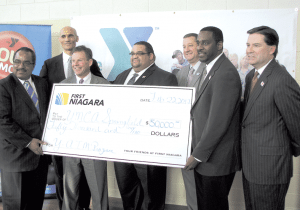 The YMCA of Greater Springfield recently received a $50,000 grant from First Niagara Bank to support its Y-AIM (Achieve academically; Inspire to attend college; Move toward personal, family, and community advancement) program. The initiative works to provide talented, underachieving at-risk young people entering the ninth grade with a solid support system throughout all four years of high school. Together, the YMCAs of Greater Hartford and Greater Springfield are taking a regional approach to overcoming the obstacles young people face on the path to success. First Niagara has also pledged $50,000 to the YMCA of Greater Hartford to support its programming for at-risk teens. Pictured from left are Paul McCraven, senior vice president of Community Development for First Niagara; James O’S. Morton, president and CEO of the YMCA of Greater Hartford; Joe Shaw, first vice president and regional team leader of First Niagara Bank; Brandon Braxton, vice president of First Niagara Bank and corporate board member of the YMCA of Greater Springfield; Jim Ross, corporate board member of the YMCA of Greater Springfield; Kirk Smith, executive director of the YMCA of Greater Springfield; and Tom Creed, corporate board chair of the YMCA of Greater Springfield.
The YMCA of Greater Springfield recently received a $50,000 grant from First Niagara Bank to support its Y-AIM (Achieve academically; Inspire to attend college; Move toward personal, family, and community advancement) program. The initiative works to provide talented, underachieving at-risk young people entering the ninth grade with a solid support system throughout all four years of high school. Together, the YMCAs of Greater Hartford and Greater Springfield are taking a regional approach to overcoming the obstacles young people face on the path to success. First Niagara has also pledged $50,000 to the YMCA of Greater Hartford to support its programming for at-risk teens. Pictured from left are Paul McCraven, senior vice president of Community Development for First Niagara; James O’S. Morton, president and CEO of the YMCA of Greater Hartford; Joe Shaw, first vice president and regional team leader of First Niagara Bank; Brandon Braxton, vice president of First Niagara Bank and corporate board member of the YMCA of Greater Springfield; Jim Ross, corporate board member of the YMCA of Greater Springfield; Kirk Smith, executive director of the YMCA of Greater Springfield; and Tom Creed, corporate board chair of the YMCA of Greater Springfield.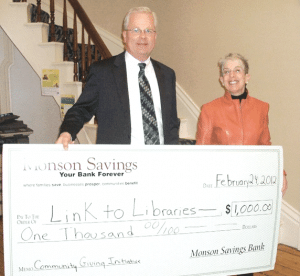 Monson Savings Bank President Steven Lowell presents Link to Libraries co-founder Susan Jaye-Kaplan with one of the 10 awards given to local organizations as part of the bank’s community-giving program. “It’s an honor to be recognized for work we do in the community and to be recognized by both Monson Savings Bank and the public,” said Jaye-Kaplan. “We truly feel privileged to do the work we do and thank Mr. Lowell and the Monson Savings Bank community.” Link to Libraries is a local, not-for-profit organization whose mission is to donate books to underserved youths in public elementary schools and nonprofit organizations in Western Mass. and Connecticut.
Monson Savings Bank President Steven Lowell presents Link to Libraries co-founder Susan Jaye-Kaplan with one of the 10 awards given to local organizations as part of the bank’s community-giving program. “It’s an honor to be recognized for work we do in the community and to be recognized by both Monson Savings Bank and the public,” said Jaye-Kaplan. “We truly feel privileged to do the work we do and thank Mr. Lowell and the Monson Savings Bank community.” Link to Libraries is a local, not-for-profit organization whose mission is to donate books to underserved youths in public elementary schools and nonprofit organizations in Western Mass. and Connecticut.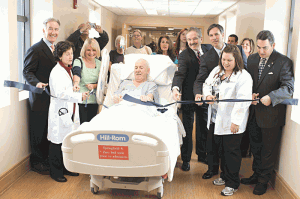
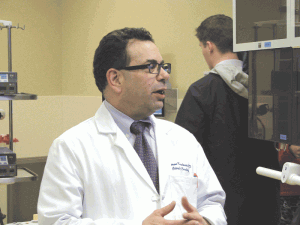
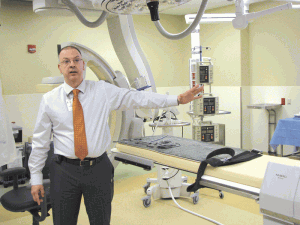
 Baystate Health recently opened the doors to the $296 million Hospital of the Future expansion, now known as the MassMutual Wing, which houses the Davis Family Heart and Vascular Center. At top, cardiac patient Siegfried Renner of Shelburne Falls, cuts a blue ribbon officially opening the new MassMutual Wing on March 2. Renner was assisted in his efforts by others with gold scissors, including, from left, U.S. Rep. Richard Neal; Dr. Mara Slawsky, director of the Heart Failure Program at Baystate; Marta Sokolowski, RN in the Davis Family Heart and Vascular Center; Mark Tolosky, president and CEO of Baystate Health; Richard Steele Jr., chair of the Baystate Health board of trustees; Heather Musselwhite, patient care technician in the Davis Family Heart and Vascular Center; and Springfield Mayor Domenic Sarno. Earler that week, BusinessWest took its own tour of facilities. Above, Dr. Kugelmass, chief of Cardiology (left), and Dr. Mark Hirko, chief of Vascular Surgery, show off one of the cardiac ICU rooms. At bottom is a view of the wing’s new ‘healing garden.’
Baystate Health recently opened the doors to the $296 million Hospital of the Future expansion, now known as the MassMutual Wing, which houses the Davis Family Heart and Vascular Center. At top, cardiac patient Siegfried Renner of Shelburne Falls, cuts a blue ribbon officially opening the new MassMutual Wing on March 2. Renner was assisted in his efforts by others with gold scissors, including, from left, U.S. Rep. Richard Neal; Dr. Mara Slawsky, director of the Heart Failure Program at Baystate; Marta Sokolowski, RN in the Davis Family Heart and Vascular Center; Mark Tolosky, president and CEO of Baystate Health; Richard Steele Jr., chair of the Baystate Health board of trustees; Heather Musselwhite, patient care technician in the Davis Family Heart and Vascular Center; and Springfield Mayor Domenic Sarno. Earler that week, BusinessWest took its own tour of facilities. Above, Dr. Kugelmass, chief of Cardiology (left), and Dr. Mark Hirko, chief of Vascular Surgery, show off one of the cardiac ICU rooms. At bottom is a view of the wing’s new ‘healing garden.’
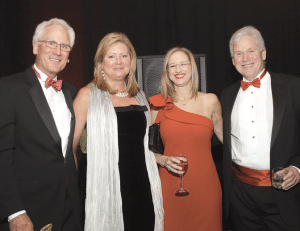
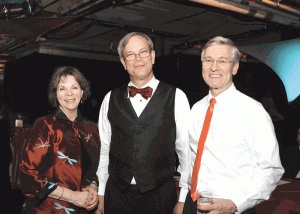
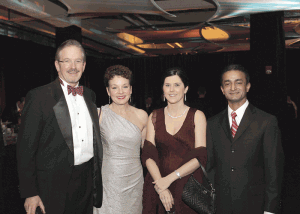 There were several events leading up the dedication of the MasMutual Wing on Feb. 28 and the ribbon cutting on March 2. Among them were the Hearts Saving Hearts Gala for major donors to the campaign supporting the hospital’s expansion project on Feb. 25. Top, Dr. John Rousou, chief of Cardiac Surgery at Baystate Medical Center (left), and Dr. Gordon Josephson, chief operating officer for Baystate Medical Practices, enjoy a light moment. At second from top, couples (from left) Timothy Delaney and his wife, Katherine Putnam, who serves on the Baystate Health board of directors, and Dr. Laurie Gianturco, chair of the Department of Radiology at Baystate, and her husband, Neil Swinton. Baystate also held the Red Tie Physicians’ Gala on Feb. 26. Third from top, Dr. Richard Wait, chair of Baystate’s Department of Surgery (center), stands with BMC medical staff member Dr. John Egelhofer of Chestnut Medical Associates and his wife, Janet Egelhofer. At bottom, couples (from left) Mark Tolosky, president and CEO of Baystate Health, and his wife, Noreen Tolosky, with Dr. Ashequl Islam from Baystate’s Cardiology Division and his wife, Melissa Islam.
There were several events leading up the dedication of the MasMutual Wing on Feb. 28 and the ribbon cutting on March 2. Among them were the Hearts Saving Hearts Gala for major donors to the campaign supporting the hospital’s expansion project on Feb. 25. Top, Dr. John Rousou, chief of Cardiac Surgery at Baystate Medical Center (left), and Dr. Gordon Josephson, chief operating officer for Baystate Medical Practices, enjoy a light moment. At second from top, couples (from left) Timothy Delaney and his wife, Katherine Putnam, who serves on the Baystate Health board of directors, and Dr. Laurie Gianturco, chair of the Department of Radiology at Baystate, and her husband, Neil Swinton. Baystate also held the Red Tie Physicians’ Gala on Feb. 26. Third from top, Dr. Richard Wait, chair of Baystate’s Department of Surgery (center), stands with BMC medical staff member Dr. John Egelhofer of Chestnut Medical Associates and his wife, Janet Egelhofer. At bottom, couples (from left) Mark Tolosky, president and CEO of Baystate Health, and his wife, Noreen Tolosky, with Dr. Ashequl Islam from Baystate’s Cardiology Division and his wife, Melissa Islam.



